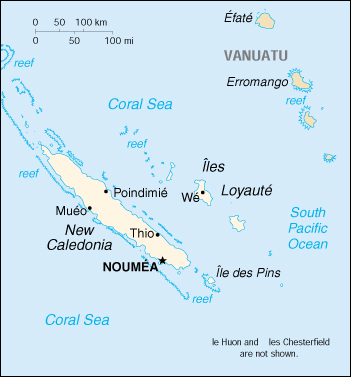

Status Quo Side: French Government
Non-Status Quo Side: Kanak Separatists
Region: Pacific, East Asia & SE Asia
Conflict Type: Colonial Issues in Dispute: Independence
New Caledonia, a French colony, includes indigenous Kanaks, European and other ethnic settlers. By 1900 Europeans owned some 90 per cent of the land with Kanaks confined to reservations. In 1946 such constraints ended and the Kanaks, now 45 percent, demanded independence. Europeans were opposed. In 1984 France legislated more self-government and a 1989 vote on self-determination. The Kanak Front de Liberation Nationale Kanak Socialiste (FLNKS) saw this as indefinite postponement of independence. The settlers' Rassemblement pour la Caledonie dans la Republique (RPCR) protested concessions to the Kanaks. FLNKS boycotted the 1984 election, built barricades and set up "liberated enclaves". Former Gaullist Minister Edgar Pisani, sent to investigate, recommended in January 1985 that New Caledonia be "independent and associated with France" following a referendum including all with 3-year residence. The Kanaks saw the voting rules as a settler veto, and the settlers also protested.
Days later, the FLNKS Libyan-trained militant "minister of internal security", Eloi Machoro, was assassinated. 3,000 French troops arrived, followed on January 18 by Prime Minister Francois Mitterand who met with the factions. Regional elections in September 1985 gave the RCPR 25 of 48 seats in the territorial congress, but FLNKS won control of 3 of 4 regional councils, reflecting support outside Noumea, the capital.
In late 1987 the Chirac government created an "executive council" with a settler majority. Conflict escalated on April 22 1988 when Kanaks, seeking to disrupt April 24 elections, launched attacks on police and settlers seeking refuge with them. French commandos storming Kanak strongholds caused more casualties. A new socialist French government lessened tensions and on June 26 1988 reached agreement with FLNKS and RCPR leaders. The Matignon Accord suspended the executive council for a year, followed by direct rule in July 1989 based on 3 relatively autonomous regions and, most controversially, a 1998 referendum on the territory's future with relatively inclusive voting rights. The French electorate approved, but the Chirac government claimed the option of refusal if returned to power. In May 1989 the moderate FLNK leader was assassinated and replaced by a member of the hardline pro-independence Socialist Party for Kanak Liberation (PALIKA). In September 1992 a Popular Congress of the Kanak People (Congress Populaire) formed to seek independence and revival of traditional customs.